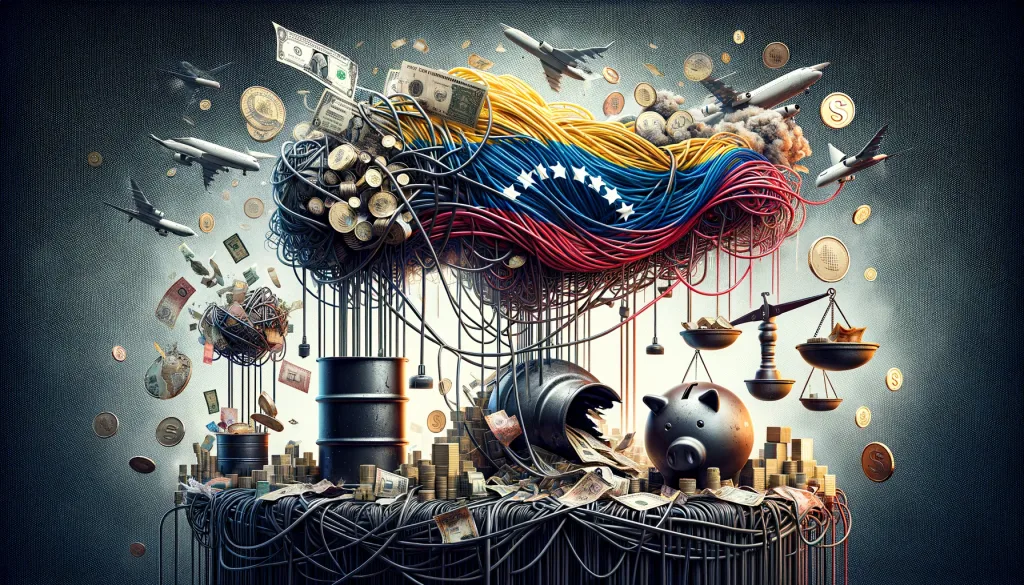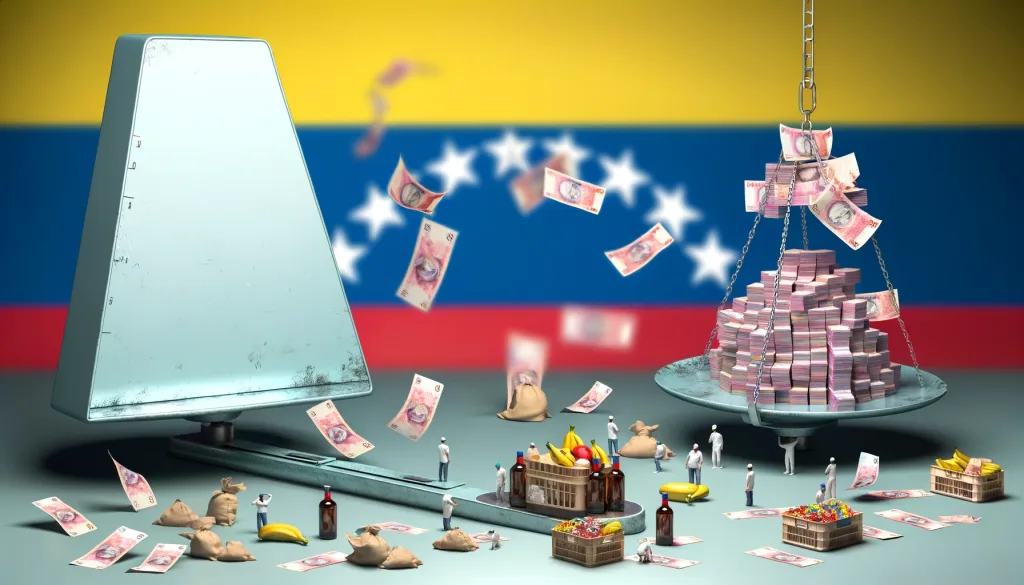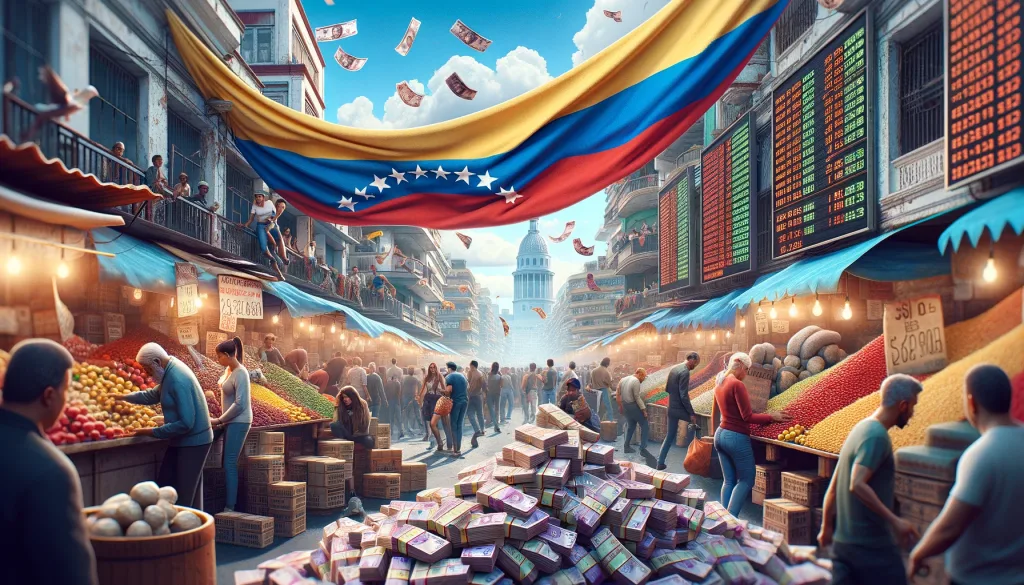Understanding the Concept of Hyperinflation
Hyperinflation is an economic phenomenon marked by a very high and usually accelerating rate of inflation. At its worst, this may lead to the breakdown of a nation’s monetary system, the collapse of the financial sector, and ultimately, a major economic crisis. As a case in point, during hyperinflation, the cost of goods and services within the economy can increase drastically on a daily or even hourly basis, as the devaluation of currency becomes rampant.
In essence, hyperinflation occurs when a country’s government begins printing money in surplus amounts to meet its spending requirements. This over-saturation of money circulating in the economy can erode its value and subsequently, skyrocketing prices. This situation typically presents a dire financial reality for the citizens of the affected country, as the purchasing power of their income or savings plummets dramatically. A closer look at Venezuela presents a poignant example of these dynamics in play.
The Economic Landscape of Venezuela Prior to Inflation Surge
In the years preceding the inflation surge, Venezuela boasted one of the stronger economies in Latin America, significantly bolstered by the nation’s huge oil reserves. In this period, the government heavily relied on high oil prices as a source of revenue, with oil exports constituting approximately 50% of GDP and an astounding 90% of total exports.
However, beneath this seemingly prosperous facade lay numerous systemic issues. The economy was characterized by high public spending, poorly managed fiscal policies, and a profound over-reliance on oil, thus leaving it extremely vulnerable to the fluctuations of global oil prices. The lack of economic diversification and the failure to invest in other sectors of the economy created a monoculture that made it susceptible to the devastating effects of inflation.
Unraveling the Underlying Factors of Inflation Surge in Venezuela

To comprehend the astronomical inflation rates that gripped Venezuela, one must delve deep into the spate of events and decisions that gradually led to the catastrophic economic state. Predominantly, the country’s excessive reliance on oil exports set the stage for an economic disaster. With global oil prices being highly volatile, an overdependence on such a variable market as a primary source of revenue is a recipe for instability. It was a bumpy ride for Venezuela when oil prices plunged globally, causing a massive blow to the country’s revenue and leading to a fiscal deficit.
Secondly, the confluence of poor fiscal management and rampant corruption exacerbated Venezuela’s economic woes. When oil prices were high, instead of investing in diversifying the economy or creating financial reserves, the government indulged in unrestrained spending, incurring significant public debt. Furthermore, corruption seeped into multiple state-run sectors, leading to inefficiencies and widespread economic distortions. These factors, along with others, form a complex web that has strangled Venezuela’s economy, leading to the current rampant hyperinflation.
To further dissect the causes of Venezuela’s inflation crisis, let’s break it down into several key factors:
- Over-reliance on Oil Exports: As mentioned earlier, Venezuela heavily depended on oil exports as its primary source of revenue. This over-dependence made the country vulnerable to global market fluctuations and when oil prices crashed globally, it had a devastating impact on their economy.
- Poor Fiscal Management: The government failed to manage its resources efficiently during periods of high oil prices. Instead of using this period to diversify the economy or build financial reserves for future uncertainties, they indulged in unrestrained spending which led them into significant public debt.
- Rampant Corruption: Corruption is another major issue that has plagued Venezuela’s economic landscape. It seeped into various state-run sectors causing inefficiencies and widespread economic distortions.
- Lack of Economic Diversification: The Venezuelan government did not invest enough in other sectors like agriculture, manufacturing etc., leading to an unhealthy reliance on one industry – oil.
- Mismanagement of Public Funds: There was also significant misallocation and misuse of public funds which further worsened the fiscal deficit situation in the country.
In conclusion, these factors have collectively contributed towards creating a complex web around Venezuela’s economy resulting in rampant hyperinflation. To recover from such a dire situation would require strategic planning and efficient management by introducing stringent anti-corruption measures along with efforts aimed at diversifying their economy.
Government Policies and Inflation: An In-depth Analysis
The determinant role of government policies in the outbreak and exacerbation of inflation in Venezuela can be hardly overemphasized. This Latin American nation had been blessed with abundant oil reserves, the highest in the world, but unfortunate strategic decisions and ill-conceived monetary policies led to an alarming collapse of the economy. The sustained hyperinflation was largely a consequence of the government’s decision to maintain an overvalued exchange rate and print money to finance a large budget deficit, all in a context of decreasing oil revenues and overall economic instability.
On top of this, the Venezuelan government’s severe and widespread price controls further alienated the country’s business sector and led to an acute shortage of basic goods. By controlling the prices of commodities far below the market price, the government inadvertently incentivized black-market activities and smuggling. The controls drastically reduced the incentives for local production, resulting in over-reliance on imported goods and exacerbating the country’s dwindling foreign reserves. These factors, in combination, presented a fertile ground for the unprecedented inflation surge that brought about devastating impacts on Venezuela’s economy and its citizens.
The Role of Currency Devaluation in the Inflation Crisis

Currency devaluation has played a significant role in the inflation crisis that Venezuela is grappling with. It is a complex economic procedure where a country lowers the value of its national currency either against a set standard or against the currency of another nation. In most cases, a devaluation is pursued by governments as a means to boost their exports, making them cheaper and more attractive to foreign companies and individuals. However, this also makes imports more expensive, which can lead to problems when a country relies heavily on imported goods, as was the case with Venezuela.
Over the years, the practical impact of currency devaluation on Venezuela’s inflation crisis has been severely felt. The cost of imports, particularly essential goods such as food and medication, skyrocketed, making it unaffordable for many citizens. Simultaneously, the expectation of further devaluation caused a vicious cycle. People rushed to get rid of their Venezuelan bolivars and buy foreign currency before their money lost even more value, thereby increasing the downward pressure on the already devalued currency. This paradoxically escalated the very inflation the devaluation was intended to alleviate.
Correlation Between Inflation and Unemployment Rates in Venezuela
As the soaring inflation rates continued to wrest havoc on the Venezuelan economy, its adverse effects became glaringly evident in the unemployment rates as well. The formerly oil-rich nation suddenly found itself wrestling with an untenably high jobless population as corporations buckled under the pressure, downsized their workforce, or shut their operations entirely. The grim reality of the situation was underscored by data from the National Institute of Statistics in Venezuela indicating that unemployment reached a record-setting 44% at the peak of the crisis in 2020.
In the realm of economics, the phenomenon known as “stagflation” describes a situation where the economy faces stagnant growth coupled with high unemployment and inflation rates. Stare into the mirror of Venezuela’s economic crisis, and one sees the embodiment of this dreaded situation. As the inflation rates escalated, companies struggled to stay afloat amidst escalading operation costs and dwindling profits, thereby prompting massive layoffs and cultivating an environment conducive to illustrious unemployment rates. Thus, the narrative of Venezuela’s inflation crisis remains incomplete without acknowledging its disastrous impact on the nation’s employment landscape.
The Ripple Effects of Inflation on the Venezuelan Economy
The Venezuelan economy faced a deluge of challenges following the inflation surge. One of these difficulties is the rapid plunge of consumer buying power. Hyperinflation erodes the value of the Venezuelan Bolivar, consequently pushing the prices of consumer goods sky high. The sad reality is that salaries and wages have been unable to keep pace with these meteoric inflation rates, leading to a drastic fall in living standards, as families can purchase far less than before.
Additionally, the inflation surge significantly influenced the business landscape in Venezuela. Companies found themselves trapped in a difficult situation, with costs of production escalating dramatically due to price hikes in raw materials, energy, and labor. It’s no surprise that many businesses, particularly smaller ones, faced insolvency as they struggled to stay afloat in these stormy economic conditions. Furthermore, local businesses also grappled with a steep decline in consumer demand, as the stratospheric prices forced consumers to prioritize essential over non-essential goods.
Exploring the Social Impact of Inflation: A Focus on Venezuelan Households

The social impact of Venezuela’s hyperinflation crisis has been undeniably profound, reaching far into the homes of millions and dismantling the standard of living for many. Inflation has drastically influenced the purchasing power of the Venezuelan Bolívar, affecting households’ access to basic necessities such as food, medication, and shelter. Rapid inflation has meant the Bolívar’s value is consistently plummeting, creating an environment where basic commodities become exorbitantly expensive, and necessities become luxuries.
Furthermore, stories emerging from Venezuela have told tales of families unable to afford basic medicines, empty grocery stores, and a significant decrease in household income. The pressures of hyperinflation increase the wealth disparity, further driving those in lower income brackets into poverty. The surge in inflation has led to significant portions of the population being unable to meet their basic needs, leading many Venezuelans to emigrate in search of better economic opportunities.
Surviving in an Inflation-Driven Economy: Stories from Venezuela
In the face of surmounting economic challenges, the resilient people of Venezuela have devised unconventional ways to adapt to their inflation-driven economy. From garage-based cryptocurrency mining to alternate forms of bartering, survival in these harsh times is fueled by creativity and resilience. Educational professionals, once working for the country’s esteemed schools, now turn to online tutoring for students in foreign countries. Amazon’s Mechanical Turk, a crowdsourcing marketplace, has become a lifeline for many, as it offers micro-tasks that pay in dollars.
As individuals and families grapple with skyrocketing prices of food and healthcare, another survival strategy lies in cultivating a back-to-core lifestyle. Personal farms and gardens have sprouted amidst the urban landscape as families realize the value in producing their own food. Parallel markets have blossomed where goods can be exchanged directly, circumventing the hyperinflated currency. Amid the thunderous chaos of the economic crisis, stories of tenacity and innovation surface, painting a poignant picture of survival in an inflation-driven economy.
Mitigation Measures and Future Projections for Venezuela’s Economy
Faced with an economy battered by hyperinflation, urgent and strategic measures need to be implemented to stabilize the situation and chart a pathway forward in Venezuela. A multi-faceted approach that includes fiscal reforms, monetary policies, and external assistance is required. Fiscal reforms involve curtailing the voracious printing of money, reduction of the budget deficit, the instigation of well-structured taxation systems, and curbing corruption. Monetary policies that target stability of the Bolivar currency, such as regulation of money supply and exchange rates, could also be essential in this regard. External assistance, such as foreign aid or long-term loans from institutions like the International Monetary Fund (IMF), can provide a critical lifeline as Venezuela endeavors to repair its economy.
In terms of future projections, it is important to tread carefully, recognizing that such predictions rely on a multitude of factors, including political will and global economic trends. Nevertheless, should Venezuela successfully implement and sustain the above mitigation measures, it could brace the country for steady, though gradual, economic recovery. A potential future scenario might see Venezuela regaining its economic sovereignty, reducing unemployment rates, and improving living standards for its citizens. However, the journey towards fully restoring Venezuela’s economic health is likely to be long and fraught with challenges, necessitating resilience, commitment and a global approach to problem-solving.
What is the concept of hyperinflation?
Hyperinflation refers to an extremely high and typically accelerating inflation. It quickly erodes the real value of the local currency, as the prices of all goods increase. This creates a situation where the general population prefers to use a more stable foreign currency.
How was Venezuela’s economy before the inflation surge?
Prior to the inflation surge, Venezuela’s economy was largely dependent on its oil revenues, which accounted for about 95% of export earnings. However, despite having the world’s largest oil reserves, the nation’s economy was already showing signs of instability due to lack of diversification and mismanagement.
Can you explain the factors that led to inflation surge in Venezuela?
There were several factors that led to the inflation surge in Venezuela, including government policies, sanctions, oil price crash, economic mismanagement, and lack of sufficient foreign reserves.
How did government policies contribute to inflation in Venezuela?
The government policies, including price controls and expropriation of businesses, discouraged private sector participation, leading to a drop in production. Moreover, excessive printing of money to cover budget deficits led to high inflation.
How has currency devaluation contributed to the inflation crisis in Venezuela?
The devaluation of currency led to an increase in the price of imported goods, further fueling hyperinflation. It also reduced the purchasing power of the Venezuelan population, leading to an increase in the cost of living.
Is there a correlation between inflation and unemployment rates in Venezuela?
Yes, there is a correlation. The high inflation has led to a decrease in the purchasing power of the population, leading to decreased demand for goods and services. This in turn has led to business closures and increased unemployment rates.
How has inflation affected the Venezuelan economy?
Inflation has had a profound impact on Venezuela’s economy. It has shrunk the economy, increased poverty rates, triggered a humanitarian crisis, caused shortages of goods and services, and led to high unemployment rates.
What are the social impacts of inflation on Venezuelan households?
The inflation has led to a decrease in the purchasing power of Venezuelan households, increasing their cost of living. It has also resulted in shortages of essential goods and services, leading to a decrease in the quality of life.
How are Venezuelan residents managing to survive in such an inflation-driven economy?
Many Venezuelans are resorting to various coping mechanisms such as bartering, using foreign currencies, and relying on remittances from abroad. Some are also engaging in informal economies to survive.
What are the mitigation measures and future projections for Venezuela’s economy?
Some of the mitigation measures include encouraging private sector participation, diversifying the economy, implementing sound monetary policies, and seeking international aid. The future projections are largely dependent on the implementation of these measures. There are hopes that with effective policies, Venezuela’s economy can recover.

